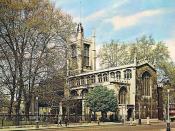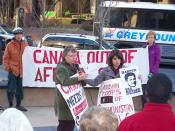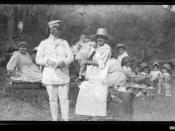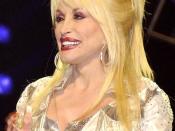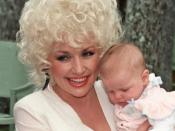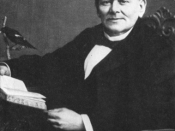The Wilcoxes, with the exception of Ruth, are ÃÂjournalismÃÂ rather than ÃÂliteratureÃÂ. Although some of their qualities, for example their efficiency and HenryÃÂs money-making skills, can be admired, it is almost impossible not to let their worse traits override these when forming an opinion on them.
Charles is the ÃÂWilcoxes at their worstÃÂ personified. He is materialistic, aggressive and self centred. In chapter 21, he sees his father and MargaretÃÂs engagement as a financial threat and takes it out on his poor wife, blaming her for it in an obscure and unfair way, when in fact Margaret has no intention of interrupting their inheritance. Charles of course would never be able to see this ÃÂ he is suspicious and believes they have ulterior motives for their interaction with his family, and proceeds to use Dolly to blame for being ÃÂon toastÃÂ financially. In this chapter he is also unreasonable about this SchlegelÃÂs, he threatens them to Dolly, warning they must be ÃÂon their best behaviourÃÂ or else heÃÂll ÃÂput [his] foot downÃÂ.
This again illustrates this unreasonable and aggressive nature that seems to be a common factor among the family.
Chapter 22 opens with MargaretÃÂs intentions of changing Henry, helping him build ÃÂthe rainbow bridge that should connect the prose in us with the passionÃÂ, she wanted to ÃÂspan their lives with beautyÃÂ. But, even at this early stage, she realises this is not possible, due to his ÃÂobtusenessÃÂ. He sees things in black and white, and this annoys Margaret, in even the simplest conversation she can see ÃÂthe milestones, the collisions, the illimitable viewsÃÂ. She brings this up with Henry, but in is narrow mindedness he cannot see the sense in ÃÂfrittering away [his] strength on that sort of thingÃÂ. Henrys motto is ÃÂConcentrateÃÂ, which he believes works well for him but inevitably by concentrating hard on only one thing at any given time he fails to see the bigger picture or the ÃÂpoetryÃÂ in life which Margaret cares so deeply about.
Another example of his obtuseness and complete disregard for other peoples feelings when he calmly says ÃÂNot a bad business that PorphyrionÃÂ, after the SchlegelÃÂs have told Leonard Bast, on HenryÃÂs advice to leave there and find another job. After he drops this bombshell on the sisters, he goes straight on to talk about a letter heÃÂs had, and almost completely ignores MargaretÃÂs attempts to find out what he meant by this. His own business problems and worries are always the centre of his conversations. He also completely denies all responsibility for Leonards now reduced salary, saying that this is just ÃÂpart of the battle of lifeÃÂ. He seems to even blame the sisters for feeling sorry for him, rather than accept responsibility for Leonard now having even less money.
Bibliography: Howards End (E. M. Forster) & my own head.
